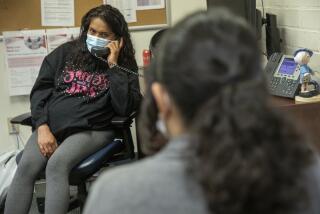Patent Rift Stalls Freeway Call Box Plan, Again
- Share via
Further delaying an already much-postponed project, a San Diego County agency decided Monday to seek a new round of bids for freeway emergency call boxes after the company that was in line to get the $8.8-million job disclosed at the eleventh hour that it is involved in a patent dispute.
With its members visibly exasperated--one so much so that he suggested scuttling the troubled project--the San Diego Service Authority for Freeway Emergencies (SAFE) voted to solicit new bids next month after the surprising disclosure by Anaheim-based Comarco Inc. provided the latest in a series of legal and procedural problems that have plagued the proposal.
Frustration Builds
“It keeps getting more and more frustrating,” said San Diego City Councilwoman Gloria McColl, who chairs the SAFE board. “I’d just like to finally find a way to get out of court and through this process so that we can start getting some call boxes on our freeways.”
If the rebidding process proceeds smoothly--a risky assumption in light of the project’s troubled history--SAFE officials hope to award a contract in May and predict that the call box system could be in place by the end of this year.
Last summer, SAFE awarded a contract to Comarco calling for 963 call boxes to be installed along the county’s 300-mile freeway system to make it easier for motorists to telephone for help in the event of automobile problems or other emergencies. The project is an outgrowth of the controversy that arose 2 1/2 years ago after one woman was killed and another was raped at gunpoint when their cars broke down on freeways.
The contract was challenged in court, however, by Cubic Corp., a San Diego-based firm that had bid about $500,000 less than Comarco. Ruling that SAFE’s action violated competitive-bid procedures, a Superior Court judge nullified the contract with Comarco and ordered the agency to award the project to the lowest responsible bidder.
In appealing that decision, SAFE officials argued that the state legislation creating the agency specifically exempted it from competitive bidding guidelines, adding that Comarco was selected because it was viewed as having more experience with the cellular phone system envisioned for the San Diego project. Last month, the 4th District Court of Appeal sided with SAFE, saying competitive bidding was not required for the call box contract.
Hopeful SAFE officials viewed that ruling as clearing the way for installation of the freeway call boxes, and the agency’s staff had recommended before Monday’s meeting that the board give final approval to the Comarco contract. Under the contract, Comarco proposed to build and install the call boxes for $4.3 million, with the project’s total price tag--including financing and maintenance costs--totaling $8.8 million over 10 years.
Plans Quashed
Those plans were dashed Monday, however, by Comarco’s disclosure of the patent dispute--a controversy that company officials treated cryptically in their comments to the SAFE board.
“A question has arisen regarding patent issues that could potentially affect the SAFE bid document and any cellular-based call box system . . . procured thereunder,” Comarco President Robert Wattenberg wrote in a letter to SAFE officials.
Though Wattenberg’s letter added that Comarco has “every reason to expect favorable resolution within a few days,” the firm refused to disclose the nature of the patent dispute.
“It certainly caught us by surprise,” said Granville Bowman, SAFE’s executive director. “What (Comarco) has told us doesn’t make it clear what the problem is. So, under the circumstances, it wasn’t prudent to proceed.”
SAFE officials’ frustration over the prospect of additional delays was typified by board member and county Supervisor Leon Williams, who half-seriously suggested that the panel simply drop the call box project, which is to be financed by a $1 annual fee on all registered automobiles.
“I’m beginning to think maybe we should just give the auto owner his money back and forget about the whole thing,” Williams said. “Nobody really gives a darn about public safety. They’re just concerned about their own dollars.”
San Diego City Councilman Ed Struiksma told Williams that he shared his frustration but urged him and the other SAFE board members to not be overly discouraged by the latest setback to the project.
“It is unfortunate beyond all measure that we’ve found ourself mired in the judicial process,” Struiksma said. “But there’s a tremendous need out there . . . and we as a board must proceed on.”
Under Monday’s action, Comarco, Cubic and other firms will have until April 15 to submit new bids. After the bids are reviewed by a technical advisory committee, the SAFE board hopes to award a new contract in May. Based on Comarco’s projected timetable, the first call boxes could be operational within a month after the contract is awarded, with the entire system in place by the end of the year.
“At this point, I think we’re all wondering whether and when we’re finally going to see these call boxes working,” McColl concluded. “I hope this is the last problem. But I’m almost afraid to think that.”
More to Read
Sign up for Essential California
The most important California stories and recommendations in your inbox every morning.
You may occasionally receive promotional content from the Los Angeles Times.













